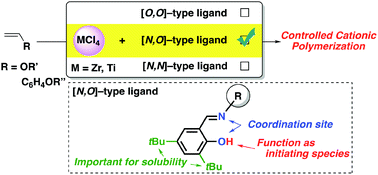Screening of metal complex catalysts using bidentate Schiff base ligands for controlled cationic polymerization of vinyl ethers using in situ complexation method†
Abstract
Various ligands were screened for the cationic polymerization of isobutyl vinyl ether (IBVE) via in situ complexation using ZrCl4 as a catalyst precursor. [N,O]-Type phenoxyimine ligand frameworks were found to be more efficient for controlled polymerization compared to ligands that coordinate to the metal via two oxygen ([O,O]-type ligands) or two nitrogen ([N,N]-type ligands) atoms. In particular, the N-aryl phenoxyimine ligand with tBu groups on the phenol moiety was effective in terms of the controllability of the polymerization, catalyst solubility, catalytic activity, and ease of derivatization. Moreover, optimization of reaction conditions led to the expansion of the applicable metal species for controlled cationic polymerization. The polymerization of IBVE using the N-phenyl phenoxyimine ligand/TiCl4 initiating system in the absence of ethyl acetate in toluene at −78 °C produced a well-controlled polymer. In addition, the phenoxyimine/ZrCl4 systems were effective for the controlled polymerization of various monomers including St derivatives. The easily tunable electronic properties were also useful for the controlled bulk polymerization.



 Please wait while we load your content...
Please wait while we load your content...